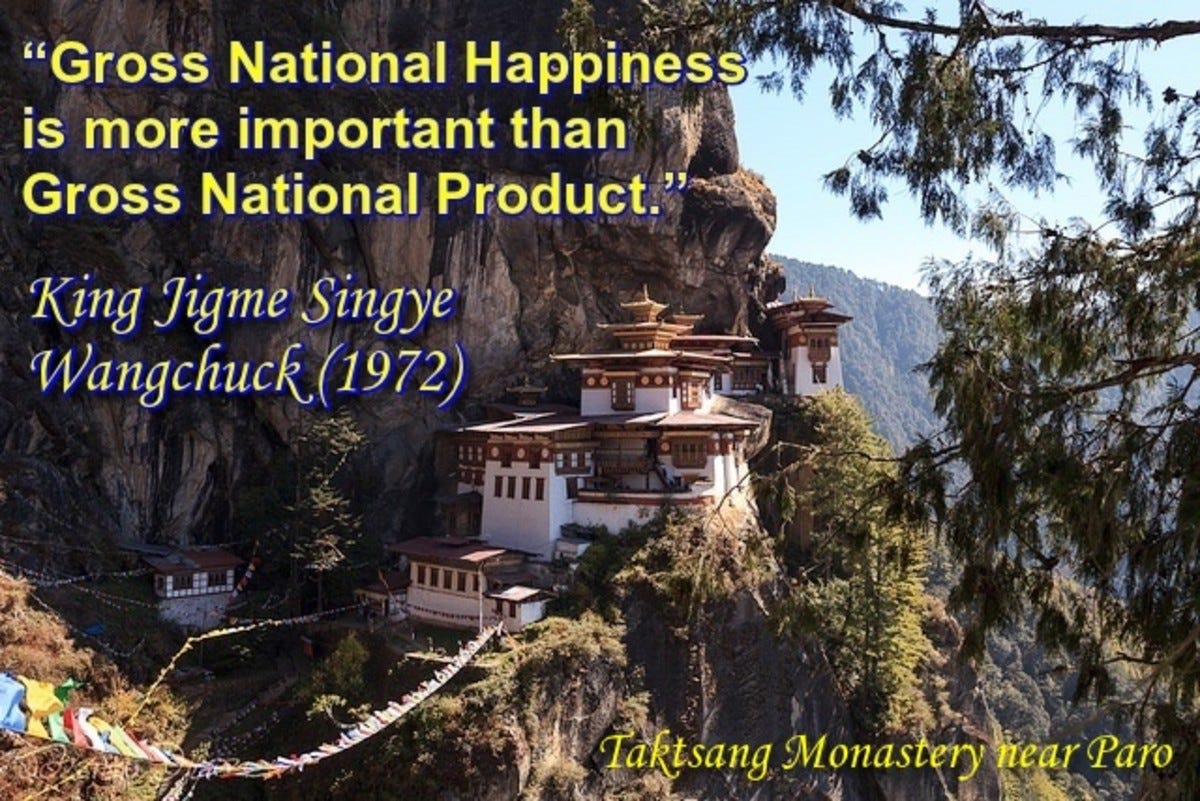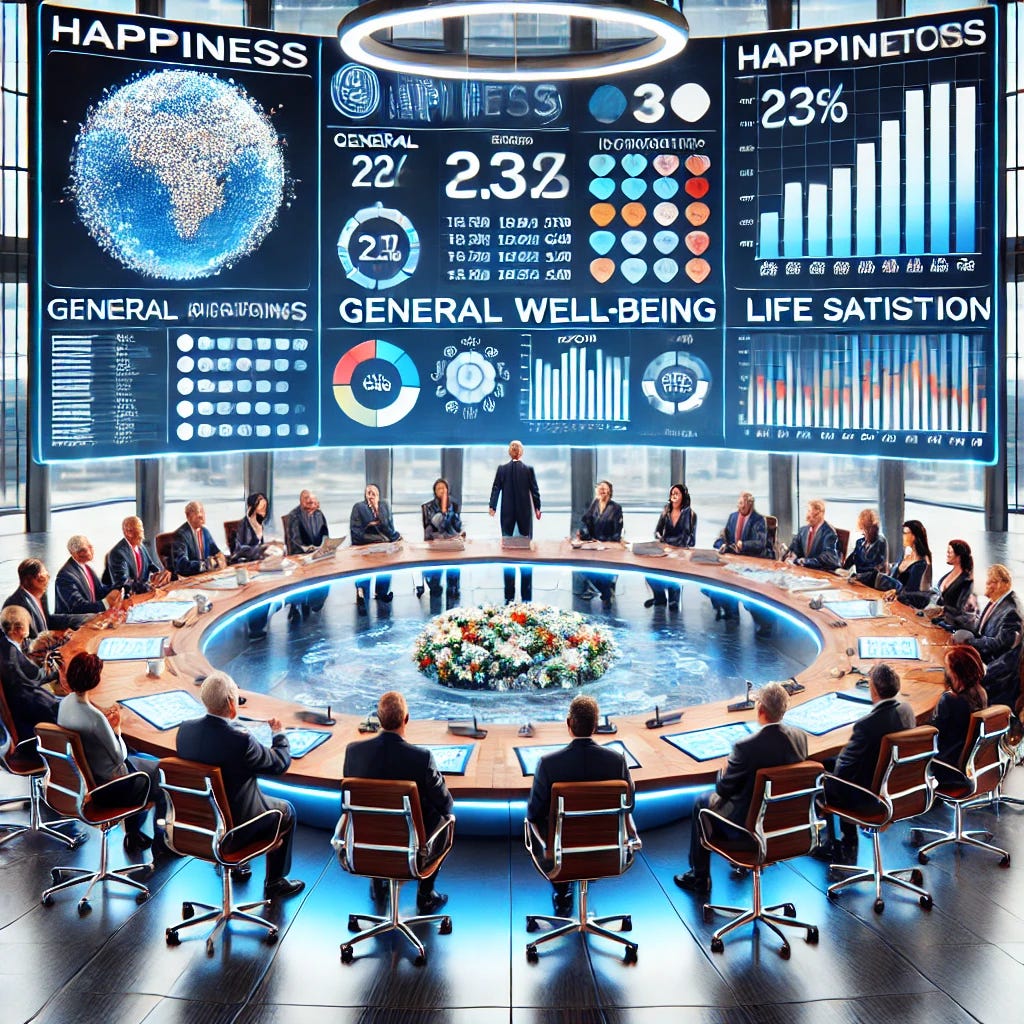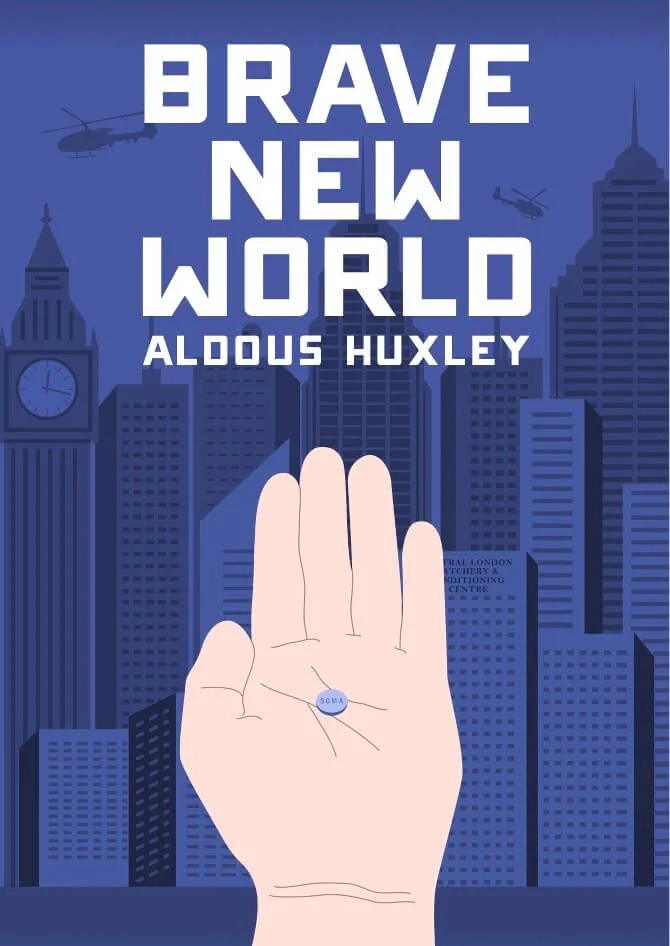The aim of maximising happiness is doomed to fail as a public policy
Utilitarianism is not compatible with how happiness works
This is the final post in my series on happiness. After several posts exploring the modern science of happiness, I conclude on the implications of this understanding for policy. Given how happiness works, the notion that public policy should aim to maximise people’s happiness is fundamentally misguided.
In 2010, the then-British Prime Minister David Cameron proposed replacing GDP with a measure of well-being:
It's time we admitted that there's more to life than money and it's time we focused not just on GDP but on GWB – general wellbeing. - Cameron1
Criticism of GDP as a measure of social progress is not new.2 A frequently suggested alternative is to prioritise measures of happiness. Indeed, one country has already adopted this approach: Bhutan, a small, landlocked nation between India and China. In 1972, its king replaced Gross National Product (GNP) with Gross National Happiness (GNH) as the primary measure of growth and progress. Bhutan has maintained this focus ever since.3
The idea that public policy should aim to maximise happiness aligns with utilitarianism, one of the most influential schools of thought in philosophy. I argue in this post, that this approach is, unfortunately, destined to fail.
The promise of utilitarianism…
The English philosopher Jeremy Bentham outlined the foundations of utilitarianism in his book An Introduction to the Principles of Morals and Legislation (1789). The principle at the heart of utilitarianism is often summarised in a single phrase: “The greatest happiness of the greatest number.”4
There is a fundamentally egalitarian aspect to utilitarianism: everyone’s well-being is regarded as equally valuable. Public policy, according to this principle, should serve the interests of all, not favour aristocrats over peasants, or billionaires over factory workers.
Moreover, utilitarianism extends this egalitarianism to all types of happiness. Bentham challenged the prevailing notion, promoted by intellectual elites, that certain pleasures—such as enjoying the opera—are inherently more noble than others, such as drinking a pint of beer at the pub. He provocatively asserted that all pleasures are equally deserving of consideration:
Prejudice apart, the game of push-pin is of equal value with the arts and sciences of music and poetry. - Bentham (1825)

Utilitarianism grew to become one of the most influential schools of thought in political philosophy, and many believe it should guide government action. In his book Happiness, the British economist Richard Layard advocated for happiness to be the central goal of public policy:
Happiness is that ultimate goal because, unlike all other goals, it is self-evidently good. If we are asked why happiness matters, we can give no further, external reason. It just obviously does matter. As the American Declaration of Independence says, it is a “self-evident”. - Layard (2005)
… that cannot be fulfilled
Habituation
The problem with aiming to maximise happiness lies in the nature of happiness itself: it is not a quantity that can be accumulated in the brain. Feelings of happiness are signals guiding our everyday decisions, both big and small. Our hedonic system—the cognitive processes that generate these feelings—has been shaped by evolution to help us make decisions that enhance our survival and reproduction.5 A key feature of these signals is that they only reflect deviations relative to expectations. Positive surprises produce good feelings, while negative surprises result in bad feelings.
A critical consequence of this design is that we continuously adapt to changes in circumstances. Unexpected improvements in our lives bring joy, while unexpected setbacks cause distress. However, we habituate to both over time, and our overall satisfaction reverts to a baseline once the surprise wears off and the new reality becomes our norm. We often believe achieving specific goals will make us happy and we strive toward them. Yet once these goals are attained, we adapt to the new conditions and shift our focus to even more challenging goals, and look to join ever higher social circles. Psychologists Brickman and Campbell (1971) coined the term “hedonic treadmill” to describe this perpetual chase for ever-elusive happiness.
Subjective pleasure is, as a state, by its very nature transient and, as a goal, an ever-receding illusion.
Supporting this view, Brickman, Coates, and Janoff-Bulman (1978) conducted a landmark study that found that individuals habituate even to what might be considered life-changing events. They examined two groups: lottery winners who had won between $50,000 and $1 million (equivalent to $240,000 to $4.8 million today) and paraplegics. Remarkably, lottery winners reported being only slightly happier than a control group, while paraplegics, although less happy than the control group, still reported being more happy than unhappy.6 Subsequent studies have confirmed similar patterns of habituation following significant events such as marriage, divorce, and illness.7
The Easterlin paradox
Another challenge to the notion of maximising happiness is the limited effect of historical improvements in material conditions on reported happiness, particularly in developed countries. Gallup surveys of happiness in the USA have shown little improvement over the past 80 years, despite dramatic increases in material well-being, health outcomes, and life expectancy. This stagnation is consistent with the idea that happiness is not something that can be reached and increased durably but rather adapts to the ever-changing contexts we face.

This phenomenon, observed globally, is known as the Easterlin Paradox. In his 1974 article, Does Economic Growth Improve the Human Lot? Some Empirical Evidence, economist Richard Easterlin argued that economic growth does not necessarily lead to higher happiness as measured by self-reported life satisfaction. Easterlin concluded:
Economic growth does not raise a society to some ultimate state of plenty. Rather, the growth process itself engenders ever-growing wants that lead it ever onwards. - Easterlin (1974)
Consider the figure below representing the percentage of people answering that their life satisfaction is positive. This proportion increases substantially between countries with very low GDP per capita and countries with average GDP per capita. However, once a country reaches a relatively high GDP per capita, this proportion does not increase much with further economic growth.8 9

The paradox is also that within a country, happiness tends to increase as individuals become wealthier relative to others. This pattern—an effect of income within countries but not between countries—can be explained by the relative income hypothesis (Clark et al. 2008): feelings of life satisfaction depend not on absolute income but on how one’s income compares to others. As a consequence, life satisfaction improves when one’s income increases relative to others in the country. However, when everyone’s income rises simultaneously, overall satisfaction may not change much.10

Both habituation and the relative income hypothesis arise from the same fundamental feature of our hedonic system: it generates hedonic feelings based on deviations from expectations. Social comparisons provide a benchmark for what we believe is achievable, making others' outcomes a source of information about our own success. Consequently, we may care about “keeping up with the Joneses” because falling behind could suggest we have not done as well as we might have.
The implications of the relative income hypothesis for public policy are profound, as Richard Layard acknowledged:
For a society as a whole the implications of social comparisons are enormous. Imagine the most extreme case, where people cared only about their relative income and not at all about their income as such. Then economic growth could not make people better off. - Layard (2005)
In some cases, social comparisons may even lead to reduced satisfaction as people grow wealthier and shift their reference group upward. The case of East Germany after reunification provides a striking illustration.
There are many clear cases where people became objectively better off but felt subjectively worse. One is East Germany, where the living standards of those employed soared after 1990, but their level of happiness fell : with the reunification of Germany the East Germans began to compare themselves with the West Germans, rather than with the other countries in the former Soviet bloc. - Layard (2005)
A new interpretation of the old challenge of “adaptive preferences”
Modern evidence on habituation echoes an old challenge to utilitarianism: preferences are adaptive.11 People’s desires are shaped by what they perceive as attainable. Philosopher Jon Elster explored this idea through La Fontaine’s fable The Fox and the Grapes. In the story, a fox, unable to reach a cluster of grapes, rationalises the situation by convincing itself that the grapes are not ripe and therefore undesirable.
The economist and Nobel Prize recipient Amartya Sen offered a similar insight, focusing on how individuals in challenging circumstances adapt to their conditions:
A person who has had a life of misfortune, with very limited opportunities, and rather little hope, may be easily reconciled to deprivations than others reared in more fortunate and affluent circumstances. […] The hopeless beggar, the precarious landless labourer, the dominated housewife, the hardened unemployed or the overexhausted coolie may all take pleasures in small mercies. - Sen (1987)
This raises difficult questions for public policy. Economists Graham and Behrman noted that trying to improve the lives of people in poor conditions might paradoxically reduce their happiness if their preferences and aspirations have been adapted to their hardship:
Should policy raise the peasant’s awareness of how bad his or her situation is in order to raise expectations, although risking making her miserable? Should policy leave the peasant ignorant? - Graham and Behrman (2010)

Sen extended these concerns to gender inequality, noting how women may come to accept conditions of subjugation as natural or just:
Simone de Beauvoir’s The Second Sex, though focused on rather different issues, gave me some ideas that proved useful in my being able to understand how it comes about that many deprived women readily accept the fog of pro-inequality apologia as a true description of reality. - Sen (2003)
Insights from cognitive neuroscience and evolutionary theory provide a comprehensive explanation for adaptive preferences. Desires and goals naturally align with the surrounding context and what is within reach. There would be no point for the hedonic system to generate dissatisfaction over unattainable outcomes. For individuals without a realistic prospect of escaping poverty, the hedonic system focuses on immediate, actionable goals—producing positive feelings for achievable successes and negative feelings for potential threats.12
The modern evidence on happiness from cognitive neuroscience, psychology, and evolutionary theory points to adaptation being not just a possibility, but a central aspect of hedonic feelings at all levels of income and social success.
Happiness is not a measurable quantity that can be accumulated
Happiness is not a measurable quantity that can be increased through public policy. Happy feelings are temporary experiences designed to guide us in our daily decisions. They point us in the right direction. If an outcome exceeds expectations, they encourage us to repeat the behaviour; if it falls short, they prompt us to reconsider our approach. However, once these feelings pass, we tend to return to a baseline level of moderate happiness.13
Can we solve this problem by considering the maximisation of the sum of these temporary feelings? It is unclear that it is actually what people want. A life filled with constant pleasurable experiences may not align with what people truly value. Most individuals would reject the idea of living permanently plugged in Nozick’s “experience machine”—a hypothetical device that provides endless pleasurable experiences while masking reality—or in Aldous Huxley’s dystopia of Brave New World (1932), where happiness is chemically induced through a daily drug regimen.
The pitfalls to expect from utilitarian policy-making
Policies inspired by utilitarian principles can fail to anticipate habituation and lead to choices that do not increase well-being in the long run. Policies promoting income growth might, for instance, opt to foster more competition. A more rat-race environment might be more conducive to income growth, but due to habituation, people might prefer to opt out of it if they knew they would habituate to these higher incomes.14
Another possible risk is to fail to appreciate that people do not want maximum happiness in the short term, but life conditions and perspectives that often require non-pleasant choices in the present. A utilitarian government might be prone to the wrong type of present vs future trade-offs. Policies designed around transient spikes in happiness may ignore structural changes that are painful now but lead to long-term societal developments, such as investments in education, infrastructure, or public health.
In addition, the fact that people are often mistaken about what will make them happy paves the way for paternalism. Aiming to make people happy may be in tension with aiming to respect their choices. It might justify designing public policies in ways that might trump people’s autonomy (Loewenstein and Ubel 2008, Qizilbash 2012). Paternalism then raises new questions: who will be the judges of what makes people truly happy? There was at least a democratic aspect in the utilitarianism of Bentham, it respected people’s decisions about what makes them happy.15
Finally, because they do not start from a solid understanding of the true nature of happiness, utilitarians are bound to become entangled in Byzantine arguments about the “correct” policy. Some debates within utilitarianism reflect this limitation: Are people truly happy when their happiness is based on false beliefs, and if so, are such beliefs justifiable as “noble lies”? Is pain simply negative happiness, and does this imply that euthanasia increases overall happiness in the world? Should the happiness of animals be considered, and if so, for which levels of consciousness—mammals, vertebrates, or others? How should future happiness be weighed, including that of people yet to be born? Does utilitarianism require maximising the number of people born to maximise the total happiness in the world?16

Utilitarianism is often seen as an appealing guide to public policy. Who would not want the greatest happiness for the greatest number? Unfortunately, utilitarianism is bound to fail. It is founded on misguided intuitions about what happiness is.17 We do not live to feel happy, but we feel happy to live and be successful in life. Not only does evolution not care about our happiness and did not design us to be happy, but we also do not primarily care about our day-to-day happiness experience when considering our overall life satisfaction. We are often willing to forego pleasures every day to achieve challenging goals in the future. We might believe that long-lasting happiness is our end goal, but, instead, happiness is nature’s trick to guide us to continually strive towards success. This misunderstanding of happiness is a major flaw in the foundations of this philosophical approach, one that makes it unsuited to be what guides public policy.1819
Beja, E.L., 2014. Income growth and happiness: Reassessment of the Easterlin Paradox. International Review of Economics, 61, pp.329-346.
Bentham, J. 1825. Rationale of Rewards
Binmore, K., 2005. Natural justice. Oxford University Press.
Brickman, P., Campbell, D., 1971. Hedonic relativism and planning the good society. Adaptation level theory, pp.287-301.
Brickman, P., Coates, D. and Janoff-Bulman, R., 1978. Lottery winners and accident victims: Is happiness relative?. Journal of Personality and Social Psychology, 36(8), p.917.
Clark, A.E., Frijters, P. and Shields, M.A., 2008. Relative income, happiness, and utility: An explanation for the Easterlin paradox and other puzzles. Journal of Economic Literature, 46(1), pp.95-144.
Duesenberry, J.S., 1949. Income, Saving, and the Theory of Consumer Behavior. Harvard University Press
Easterlin, R.A., 1974. Does economic growth improve the human lot? Some empirical evidence. In Nations and households in economic growth (pp. 89-125). Academic Press.
Easterlin, R.A., 2015. Happiness and economic growth–the evidence. in Ed. Glatzer W., Camfield L., Møller V., Rojas M. Global Handbook of Quality of Life, Springer Netherlands.
Elster, J. (1983). Sour grapes: Studies in the subversion of rationality. Cambridge University Press.
Graham, C. and Behrman, J.R., 2010. How Latin Americans assess their quality of life: Insights and puzzles from novel metrics of well-being. Paradox and Perception: Measuring quality of life in Latin America, pp.1-21.
Hare, R. M. (1981). Moral thinking: Its levels, method, and point. Oxford University Press.
Huxley, A. (1932). Brave new world. Chatto & Windus.
Kymlicka, W., 2002. Contemporary political philosophy: an introduction. New York.
Layard, R., 2005. Happiness: Lessons from a new science. Penguin UK.
Loewenstein, G. and Ubel, P.A., 2008. Hedonic adaptation and the role of decision and experience utility in public policy. Journal of Public Economics, 92(8-9), pp.1795-1810.
Oswald, A.J. and Powdthavee, N., 2008. Does happiness adapt? A longitudinal study of disability with implications for economists and judges. Journal of Public Economics, 92(5-6), pp.1061-1077.
Powdthavee, N. and Stutzer, A., 2014. Economic approaches to understanding change in happiness. In Stability of happiness (pp. 219-244). Academic Press.
Qizilbash, M., 2007. The adaptation problem, evolution and normative economics (No. 0708). Papers on Economics and Evolution.
Qizilbash, M., 2012. Utilitarianism,‘adaptation’and paternalism. In Adaptation, poverty and development: The dynamics of subjective well-being (pp. 35-60). London: Palgrave Macmillan UK.
Rawls, J., 1971. A Theory of Justice. Cambridge, MA: Harvard University Press.
Rayo, L. and Becker, G.S., 2007. Evolutionary efficiency and happiness. Journal of Political Economy, 115(2), pp.302-337.
Schwarz, N. and Strack, F., 1988. Evaluating one's life: A judgment model of subjective well-being.
Sen, A., 1999. On ethics and economics. OUP Catalogue.
Sen, A., Agarwal, B., Humphries, J. and Robeyns, I., 2003. Continuing the conversation. Feminist Economics, 9(2-3), pp.319-332.
Singer, P. (1979). Practical ethics. Cambridge University Press.
Stevenson, B. and Wolfers, J., 2013. Subjective well-being and income: Is there any evidence of satiation?. American Economic Review Papers and Proceedings, 103(3), pp.598-604.
Sugden, R., 2006. What we desire, what we have reason to desire, whatever we might desire: Mill and Sen on the value of opportunity. Utilitas, 18(1), pp.33-51.
“David Cameron aims to make happiness the new GDP” Guardian newspaper, 14th of November 2010.
One of the most iconic criticisms came from Robert F. Kennedy GDP’s limitations in 1968, while serving as a U.S. Senator: “Gross National Product counts air pollution and cigarette advertising, and ambulances to clear our highways of carnage... Yet the Gross National Product does not allow for the health of our children, the quality of their education, or the joy of their play.” Source.
GDP and GNP measure roughly the same thing: GNP is calculated based on the production by national entities (including their production abroad), while GDP is calculated based on the production within the national territory (including by foreign entities).
This formula actually seems to have originated with Joseph Priestley, in a book that predated Bentham’s contribution: Essay on the First Principles of Government (1768):
“The good and happiness of the members, that is, the majority of the members of any state, is the great standard by which everything relating to that state must finally be determined.”
‘[n]ature has placed mankind under the governance of two sovereign masters, pain and pleasure’ (Bentham, 1970, pp. 33),
Answering on a scale from 1 to 5, their average answer was 2.96.
To be entirely precise, it looks like habituation may not be complete for all types of events. Men who lose their jobs seem to experience a durable negative impact on their well-being. It is possible that for some outcomes, our hedonic system does not adapt because our expectations should be different from our conditions. For example, a man losing his job might observe that others like him still have one, concluding that unemployment is not a reasonable condition to habituate to. Rayo and Becker (2007) proposed a general model of habituation consistent with this interpretation.
Note that this graph is not ideal because it has an upper limit at 100%, which might suggest it is a ceiling effect in survey response (no more than 100% of people can say they are very happy) while the level of happiness can nonetheless keep increasing.
Some readers may have read that the Easterlin paradox had been criticised. In 2013, economists Stevenson and Wolfers argued that happiness keeps increasing at a constant rate with higher incomes. Their analysis relies however on using a log scale for income. Thus, a constant increase on that scale gives exactly the type of curve represented on the graph of the Easterlin paradox. See responses by Beja (2014) and Easterlin (2015).
The relative income hypothesis was initially proposed by the economist Duesenberry:
If a man had a thousand dollars in his mattress in 1850, he was relatively rich. A thousand-dollar hoard would be much less significant today. The standards of miserliness change with the general standard of living as much as anything else. - Duesenberry (1949)
The economist Mozaffar Qizilbash (2007) wrote a very interesting discussion on the challenge of adaptive preferences for utilitarianism as explored by Jon Elster and Amartya Sen. Several of the ideas in this section are inspired by his paper.
That is why learning that you could actually do better raises your aspirations and can reduce your happiness if you fail to improve your situation. A snappy way to summarise this was put by John Cleese in the movie Clockwise: “It's not the despair, Laura. I can take the despair. It's the hope I can't stand.”
One function of the government, foreseen by Layard, is to discourage the endless rat race for higher success that does not lead to higher happiness in society.
the struggle for relative income is totally self-defeating at the level of the society as a whole. If my income rises relative to yours, your income falls relative to mine by exactly the same amount. The whole process produces no net social gain, but may involve a massive sacrifice of private life and time with family and friends. It should be discouraged. (Layard, 2005)
The economist Robert Sugden (2006) makes the following comment about the value of Bentham’s approach in regard to the issue of paternalism:
The idea that ‘we’, as ethical theorists, can claim to know better than some particular individual what is good for her seems to open the door to restrictions on freedom. For many liberals – and perhaps particularly for liberal economists – one of the most attractive features of classical utilitarianism is its robust rejection of paternalism, famously expressed in Jeremy Bentham’s remark that if pushpin furnishes more pleasure than music and poetry, it is more valuable than either of them. Bentham’s position is attractive in providing an uncompromising defence of a certain kind of individual freedom – the freedom to act on one’s own preferences, without being required to justify them to anyone else. - Sugden (2006)
These are all actual debates in the utilitarian literature. For a discussion on whether people are truly happy when their happiness is based on false beliefs, see Hare (1971). For a discussion on whether pain is akin to negative happiness and whether euthanasia should be supported on utilitarian grounds, see Singer (1979) and Tännsjö (1998). For a discussion on whether animals’ happiness needs to be included in the maximisation of happiness, see Singer (1975, 1979). For a discussion about whether we should take into consideration the happiness of future unborn people, possibly justifying increasing the size of the population, see Singer (1979) and Parfit (1984).
This is, in a sense, a practical criticism. For a good discussion about the philosophical criticisms of utilitarianism, see the excellent chapter on utilitarianism in Kymlicka’s book Contemporary Political Philosophy: an Introduction.
The version of utilitarianism I discussed here is the most influential one. Some utilitarians have tried to propose a version of utilitarianism not based on the maximisation of hedonic feelings but on the maximum satisfaction of preferences (Singer 1979, Hare 1981). However, this is not a solution to the problems of habituation discussed here, as hedonic habituation has direct implications for preferences. Loewenstein and Ubel (2008) provide an interesting discussion of the challenges of designing public policy on the maximisation of subjective happiness or preference satisfaction. They concluded that “no simple criterion based on either concept can surmount these problems.”
You might, dear reader, feel entitled to ask what alternative philosophical approach might work better than utilitarianism. Rawls’ Theory of Justice was written to propose an alternative and is likely the most influential political philosophy book of the 20th century. His approach is contractualist. It relies on asking what rules we would agree upon if we were to form a society. Binmore provided a game-theoretic and evolutionary underpinning to this type of approach in his book Natural Justice. It is, I believe, the best approach to explain our moral intuitions and how they can guide collective decisions. I will discuss these ideas in future posts.









Fascinating topic.
I wonder what the best “yes but” responses to this thesis are? What about the idea for example that creating more income equality creates more happiness by flattening the comparison curve? Isn’t that a way of bridging your critique with a policy that still concerns itself with happiness? Same with addressing all tractable forms of suffering to which people do not hedonically adapt to like depression, anxiety and chronic pain or living in noisy, substandard housing with bad air quality and without enough money for a nutritious diet and clothes that allow one to look typical.
And just on the Nozick’s experience machine. I’ve always found his formulation unpersuasive as evidence that people don’t really want an easier life of more contentment. Entertain for example the alternative formulation where you stipulate one’s present life as being in the experience machine and the reality choice as being in a Soviet gulag for life with only rotten bread to eat, a bucket for a toilet and semi-regular beatings. Also, look at how many people take anti-depressants. That’s a form of the experience machine (and not even a particularly good one — imagine a much better drug with no side effects and much higher efficacy).
Just some thoughts.
What do you think of Sen and Naussbaum's Capabilities approach?
"Well-being" and "satisfaction" tend to measure something other than hedonia, though measuring any such thing is a scattershot scatterplot onto any number of things.
In my mind, the "measure" of a society is that it turns good intentions into good outcomes. The idea wouldn't be to actually measure it and use that number in some calculation, but simply to recognize that it is both a resource to tap and a communal responsibility as much as a social mandate of representatives. Bridging that gap is also related to GDP, satisfaction and capabilities without overcommiting to any one variable or angle.
It's easier to understand than capabilities per se, but similarly hard to measure. However, I'm not sure that's a weakness. Negotiating and debating good intentions and outcomes are part of the process of enacting them and keeping them informed on how to actually bridge the gap.